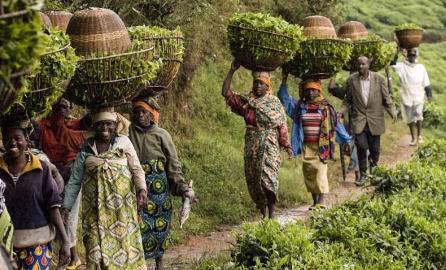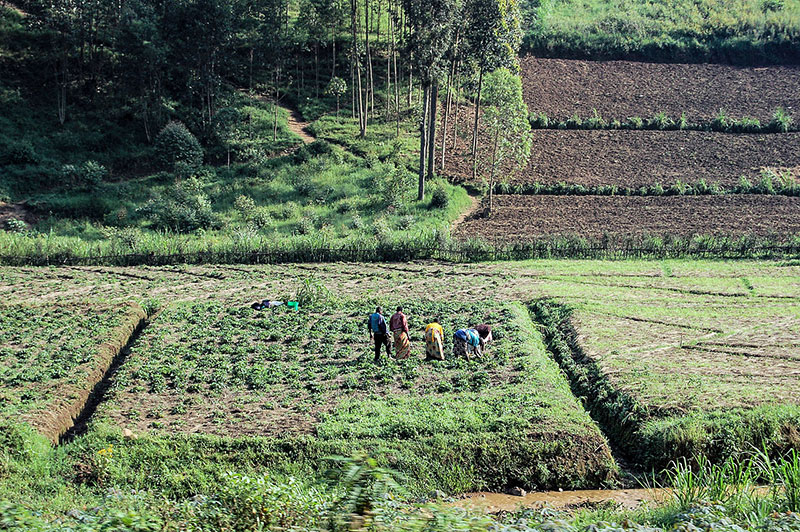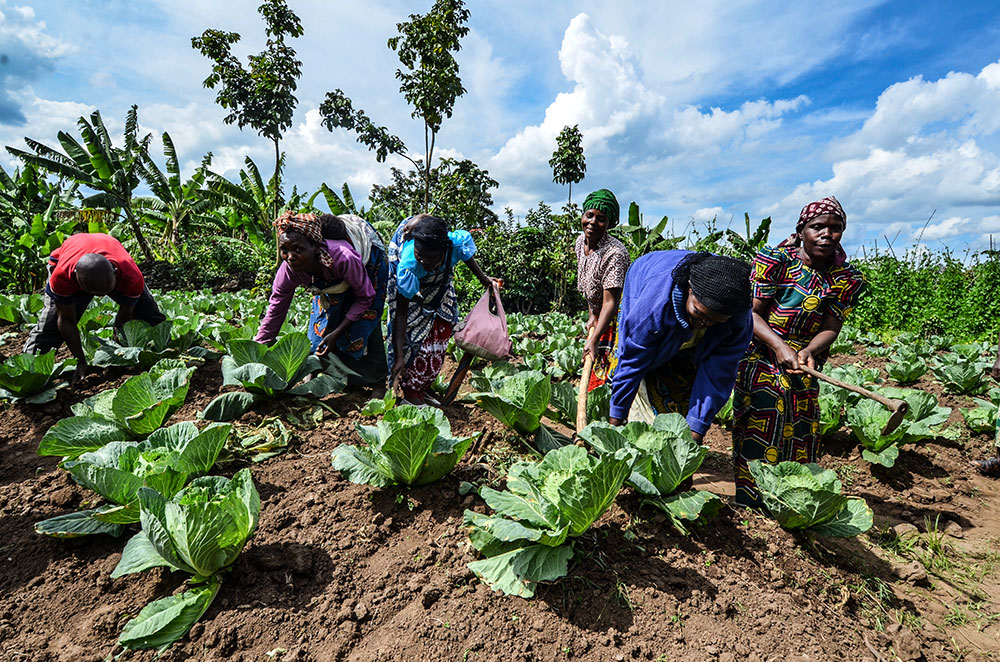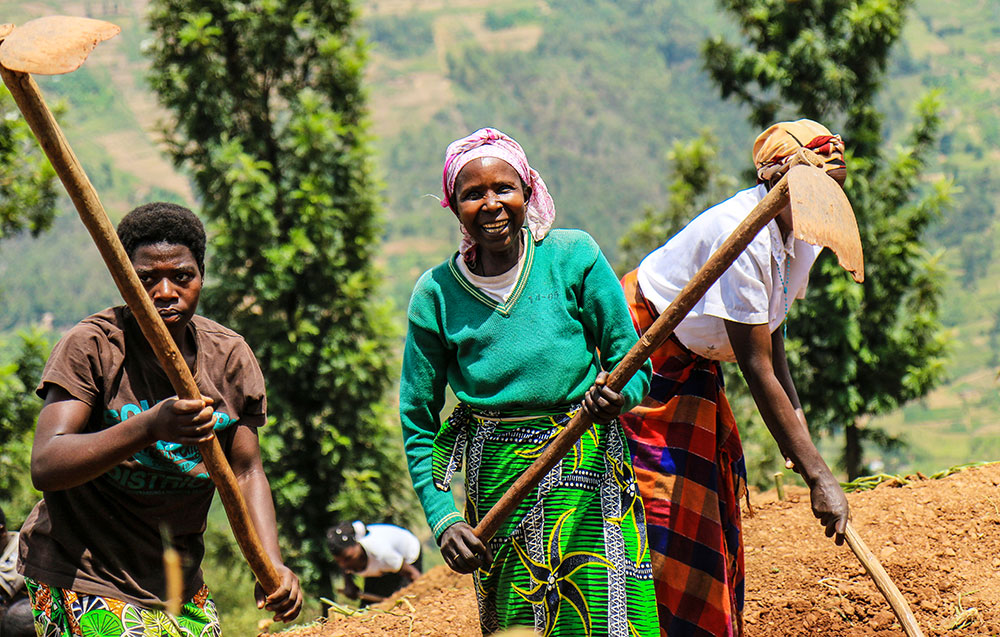In the first of our user-submitted stories, we present a think piece from the EU Delegation to Rwanda on the key lessons from the development of the country’s new strategic framework for the agriculture sector.
At a time when many African countries are striving to review their agriculture strategies, Rwanda leads the path with technical assistance and support from the European Union Delegation alongside its fellow partners.
The intervention was implemented with the Food and Agriculture Organization (FAO), and supported the elaboration of the fourth Agriculture Transformation Strategy (PTSA4). This proved unique, owing to its comprehensiveness, openness, and guarantees for sustainability.
This piece aims at analysing one model of development support to deliver a sustainable strategy that seeks to address long-standing challenges in the sector.
|
PTSA4 The recently launched fourth Agriculture Transformation Strategy (PTSA4) is a six-year programme aiming to increase farm productivity and adding value to agricultural outputs in Rwanda. The programme’s objectives are structured around four core pillars: Enabling Environment & Responsive Institutions; Productive and inclusive markets and value addition; Increased productivity, diversity, sustainability and resilience of agricultural production; and Research, innovation and empowerment. |
The first steps
Rwanda, a small and highly densely populated country, with often poor and acidic soils in a mountainous area, is facing what are likely some of the most challenging agriculture development questions of our time.
The development of a strategy that addresses these limitations and challenges was of the upmost importance, and the European Union (EU) represented by the European Union Delegation to the Republic of Rwanda, co-chair of the Agriculture Sector Working Group, was involved in the strategy design process in various capacities ranging from financing to provision of expertise.
All began with the signing of the biggest EU Budget Support contract ever in Rwanda in June 2016. A €200 million contribution to the agriculture sector for sustainable use of land and water resources, value creation and contribution to food security. The sector support was based on a strategy that would have to be revised during the course of the contract.
Hence, in accordance with the government, in April 2017, the EU provided a grant to finance FAO’s support to Rwanda in the design of the strategy and the corresponding sector investment plan. The funds were meant to finance the delivery of a fully-fledged strategy and bring in the necessary expertise, in particular through the FAO’s Investment Centre.
Launch of the 4th Agriculture Transformation Strategy in Rwanda:
The first phase of the design process began with wide-ranging consultations and data collection across the country to assess the persistent challenges that have stalled the growth of a sector that is a source of livelihood for over 85 per cent of Rwanda’s 12 million citizens.
This involved reaching out to farmers cooperatives, youth and women organisations across the nation (see sidebar Consultations). Constituencies were requested to meet independently and voice back how they see the development of the sector around eight open questions. The questions looked at past support (including the success and challenges) and asked for suggestions for the future interventions, with a specific focus on women and youth.
|
Consultations While praising the progress made so far, some constituents, like the Private Sector Federation, highlighted the need to strengthen mechanisation and increase technology, along with increasing access to inputs like improved seeds or animal breeds, pesticides and insecticides; using predictions of weather patterns and making better use of market information. Others highlighted the need for more participation, better extension of services linked to research or the development of early warning systems. To back and illustrate their concerns, stakeholders presented data and facts to prove the extent of the challenges and suggested ways to get around them. Farmers’ cooperatives under their various umbrella bodies, such as the Federation of Potato Farmers’ Cooperatives in Rwanda (FECOPPORWA), highlighted the long-standing challenge of current loan systems. These loan systems, they argued, are not friendly to farmers who have to repay them on a monthly basis, despite earning only seasonal income, every four to six months. |
Data review
The consultation process was complemented by a comprehensive data review and expert analysis, which evaluated the performance of the three agriculture transformation strategies implemented since 2004, to assess what gaps the PSTA4 should be addressing, and to identify resource requirements and review delivery approaches.
This was followed by a three-day knowledge seminar in June 2017, which gathered around 200 people from the country, regional experts and a number of African private sector leaders, all of whom reviewed inputs and brainstormed in working groups to define a first outline of the sector strategy.
The participants agreed on the first overview of the required transformations and identified outlines for the four main programmes.
In a post-process statement, FAO, which was involved alongside the EU, stated that the consultations proved vital to help the ministry get innovative ideas for the agriculture sector.
“Various stakeholder consultations were held, including with private sector, farmer organisations and women groups, to get feedback and suggestions, while maximising the involvement of all stakeholders,” the statement read. “The consultations have proven vital to help the ministry get innovative ideas that will spur the agriculture sector into uncharted areas with great success.”
The timing and method of the consultations were critical. Their organisation ahead of the development of a first draft and with nearly unrestricted room for brainstorming along a few defined headlines (related for instance to success stories to be brought forward) allowed innovative thinking, improved ownership and facilitated the whole process.
Drafting process
After the review and the consultation process, came the actual drafting of the PTSA4 document.
This stage was steered by a national task force made up of ministry officials (Agriculture, Ministry of Finance, Ministry of Land and Forestry, Ministry of Commerce, Statistics).
A majority of farmers in Rwanda till small parcels of land making it diffult to adopt mechanisation and technology.
The active steering of the government proved critical for the success of the process by providing strategic inputs, mitigating conflicts, and maximising inputs from partners.
For the coordination of all inputs, a Development Partners Nucleus (DFN) was set-up in collaboration with the government to meet every two weeks, with the additional support of the UK’s Department for International Development’s (DFID) Technical Assistance component (see sidebar Lessons from the DFN).
|
Lessons from the DFN The DFN proved very useful to streamline the process and create a trusted partnership. Among other things, the diversity of the team involved ensured that the draft was compliant with sector development blueprints, such as the national environmental policy and that there was no duplication of efforts by other stakeholders. An "independent" pen holder was nominated and worked in very close collaboration with the planning unit of the Ministry of Agriculture and Animal Resources, helping avoid dispersions and confusions on the text by mainstreaming all inputs and ensuring coherence. |
A first draft was then shared with the Agriculture Sector Working Group. As some areas were still weaker than other, some Sub-Sector Working Groups, studies and expert meetings were organised to provide specifically detailed inputs.
An expert meeting (with researchers, farmer organisations, UN organisations, development partners, and the SUN alliance), for example, met several times to review the four pillars of food security in Rwanda and defined concrete proposals for a complete package to reduce food insecurity drastically in the country.
The draft document was then subjected to national and external review to ensure that it was not only technically sound but also feasible and would have ownership among implementing stakeholders. A discussion on the second draft was organised in November 2017 with the Rwandan parliament to gather their views on inputs, with a particular focus on gender empowerment.
The resulting PTSA4 draft was also meant to be compliant with guidelines set at the continental level. Rwanda is a signatory to the African Union’s Malabo Declaration. The PTSA4 draft document was sent to the AU Commission for further review in January 2018.
In June 2018, a business meeting was organised to present the final document to all stakeholders and the strategy was finally endorsed at the cabinet level in July of the same year, just in time for the new programming phase of the country.
Joint effort
The structured organisation of the process was instrumental in ensuring the active involvement of all partners, including from other sectors.
Donor partners and UN organisations provided an impressive amount of local and international expertise; local stakeholders were encouraged to submit their inputs; and the government widely consulted internally while allowing external verification and analysis.
The joint and collaborative effort and process culminated in a strategy that elicits confidence among stakeholders that it will address critical challenges and also reflects the ambitions and targets of the sector which remains a significant source of livelihoods and driver of growth in the country.
Like in most of Sub-Saharan Africa, Farmers in Rwanda often grow subsistence crops and rely on manual methods. Farmers in a cabbage plantation in Musanze.
Among those confident on its ability to deliver are Rwanda’s Prime Minister, Dr Edouard Ngirente, who said that going by the impact of the previous phases of the programme, PTSA4 will have a profound, far-reaching impact including on job creation.
"In the PSTA4, many achievements are expected,” Ngirente said. "We are planning to increase agriculture growth and create jobs… The [agricultural] jobs will be created in primary agriculture, the agro-processing industry trade and restaurant businesses. We are also trying to raise the rate of mechanised farm operations and ensure that the country is fully food and nutrition secure."
Key lessons
Rwanda’s National Strategy for Transformation, which will run up to 2024, aims at creating 214,000 jobs per year.
Dr Octave Semwaga, Director-General of strategic planning and programmes coordination at the Ministry of Agriculture and Animal Resources, said that the key priority areas are based on the challenges identified in the consultation process and aligned with national goals.
“The four priority areas of intervention are based on the most pressing challenges and aspects that will speed up towards the strategic goals,” he said.
Most of the agriculture in Rwanda is manual and uses traditional techniques and without much mechanisation often holding back productivity. Farmers in Rulindo District.
FAO noted that, owing to its design and process, the new programme upholds a principle of “Leaving no one behind” in this transformation process.
“It is modelled on needs-based solutions for various groups of farmers and will ensure that marginal-subsistence farmers are supported with social protection programmes and other measures in terms of skills development to ensure they graduate out of subsistence farming and into jobs along the agricultural value chains and beyond (on-farm and off-farm job creation),” the organisation said in a statement.
Finally, agriculture was the first sector in Rwanda to benefit from a sector strategy under the new National Strategy for Transformation 2018-2024. It has helped to mobilise funds and its multi-stakeholder character is now facilitating its implementation.
The next challenge will be to see if during its execution and implementation whether the strategy will make a difference, meet its targets, and transform both the agricultural sector and benefit the Rwandan people.
Beyond meeting expectations to deliver a wholly owned and purposeful document, experts say that the process provided a benchmark for the development of future programmes in Rwanda and beyond, owing to its unique approach.
With a number of countries in Sub-Sahara Africa seeking to develop and modernise their respective agriculture sectors, experts say the PTSA4 development process could serve a model.
Would you like to submit your own Voices & Views article? Contact our editorial coordinator here.
This article was written by Collins Mwai, on behalf of the EU Delegation to Rwanda









Log in with your EU Login account to post or comment on the platform.